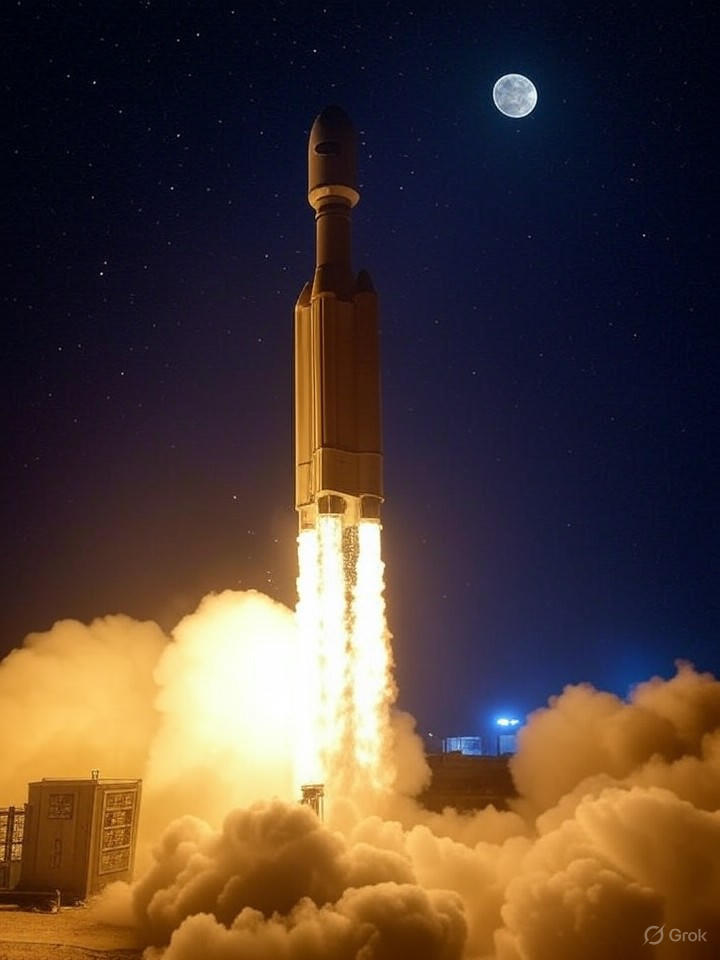Science
AI Drives Transformative Changes in Space Exploration

Artificial intelligence is reshaping the landscape of space exploration, bringing about significant efficiencies and innovations. At a recent summit in Seattle, industry leaders from companies such as Blue Origin and SpaceX discussed how AI is enhancing operations, from optimizing rocket trajectories to facilitating deep-space missions. The integration of machine learning algorithms is proving to be a game-changer, with the potential to reduce fuel consumption by up to 15% and lower mission risks significantly.
One of the most compelling developments is the use of AI-driven predictive analytics, which can forecast satellite failures before they arise. By analyzing extensive datasets from orbital sensors, this technology could extend the operational lifespan of satellite constellations like Starlink by years, potentially saving billions in replacement costs.
AI’s Expanding Role in Autonomous Spacecraft
The increasing complexity of space missions necessitates self-reliant spacecraft, with AI playing a critical role in autonomous decision-making. As missions venture farther from Earth, the ability for spacecraft to operate without constant human input becomes crucial. NASA’s ongoing projects utilize neural networks to process vast amounts of cosmic data, allowing for the identification of patterns that might escape human analysts. This capability is particularly vital for missions involving the James Webb Space Telescope, where AI algorithms enhance image clarity and improve the detection of exoplanets.
Private firms are at the forefront of these advancements. According to Lockheed Martin’s trends report for 2025, AI will revolutionize advanced communications, facilitating seamless coordination between ground stations and lunar landers. This is especially relevant for future human exploration missions, where AI could autonomously manage life-support systems during extended stays on the Moon.
Challenges and Future Prospects
Despite its potential, the rise of AI in space exploration raises important challenges. Issues such as data security and algorithmic bias have prompted calls for robust regulatory frameworks to ensure safe integration of these technologies. Looking ahead, the combination of AI with quantum computing is expected to unlock new possibilities. A recent McKinsey technology trends outlook for 2025 suggests that hybrid AI-quantum systems could accurately simulate asteroid mining scenarios, offering sustainable alternatives to traditional mining practices on Earth.
Startups are also innovating at the intersection of AI and robotics. The StartUs Insights guide highlights companies developing AI-powered drones aimed at removing orbital debris, addressing the increasing threat posed by space junk to active satellites.
Investment in AI-driven space ventures is surging, with analysts predicting exponential growth. Strategic partnerships will be essential to navigate geopolitical tensions and supply chain vulnerabilities. The European Space Agency is promoting international collaboration, focusing on standardizing AI protocols for global missions. In the United States, policy discussions are intensifying around the role of AI in national security, particularly regarding the mitigation of adversarial satellite interference.
As the space industry embraces AI, it marks a significant shift towards intelligent systems capable of adapting to complex environments. The insights shared at the Seattle summit underscore the importance of balancing innovation with oversight, ensuring that AI’s integration into space exploration maximizes its benefits while minimizing risks. This convergence of technology and exploration holds the potential to redefine humanity’s reach into the cosmos, driving both economic growth and scientific advancements.
-

 Lifestyle3 months ago
Lifestyle3 months agoLibraries Challenge Rising E-Book Costs Amid Growing Demand
-

 Sports3 months ago
Sports3 months agoTyreek Hill Responds to Tua Tagovailoa’s Comments on Team Dynamics
-

 Sports3 months ago
Sports3 months agoLiverpool Secures Agreement to Sign Young Striker Will Wright
-

 Lifestyle3 months ago
Lifestyle3 months agoSave Your Split Tomatoes: Expert Tips for Gardeners
-

 Lifestyle3 months ago
Lifestyle3 months agoPrincess Beatrice’s Daughter Athena Joins Siblings at London Parade
-

 World3 months ago
World3 months agoWinter Storms Lash New South Wales with Snow, Flood Risks
-

 Science3 months ago
Science3 months agoTrump Administration Moves to Repeal Key Climate Regulation
-

 Science2 months ago
Science2 months agoSan Francisco Hosts Unique Contest to Identify “Performative Males”
-

 Business3 months ago
Business3 months agoSoFi Technologies Shares Slip 2% Following Insider Stock Sale
-

 Science3 months ago
Science3 months agoNew Tool Reveals Link Between Horse Coat Condition and Parasites
-

 Sports3 months ago
Sports3 months agoElon Musk Sculpture Travels From Utah to Yosemite National Park
-

 Science3 months ago
Science3 months agoNew Study Confirms Humans Transported Stonehenge Bluestones









